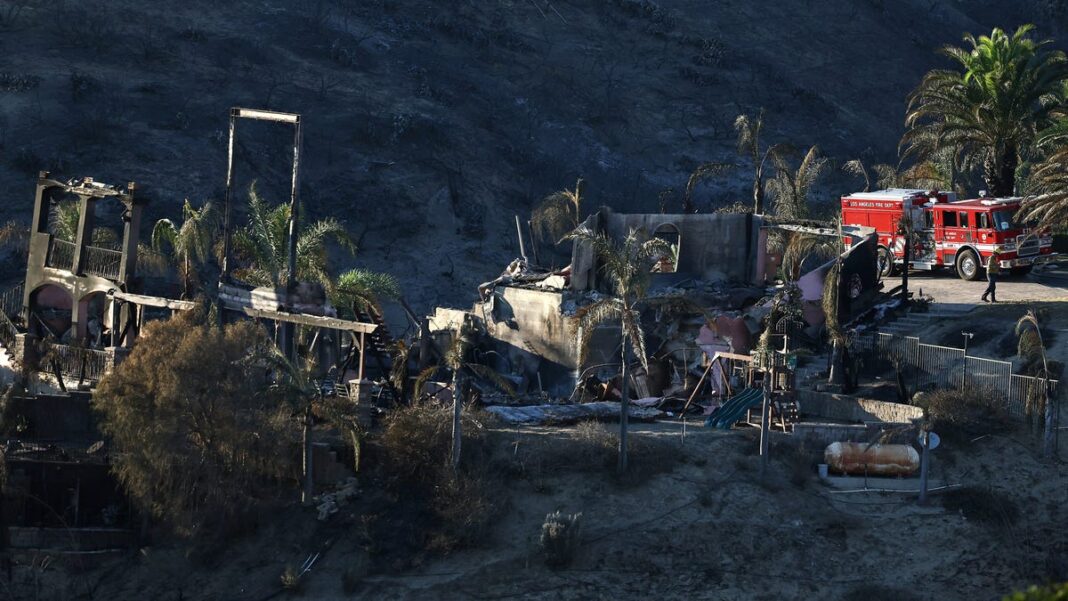Firefighters gain ground, yet the Southern California wildfire continues
VENTURA, Calif. — Thanks to better weather, firefighters were able to increase their control over the wildfire burning northwest of Los Angeles and prevent its spread over the weekend. However, residents from approximately 1,000 evacuated homes still had to remain away from their properties.
The Mountain Fire, which started on Wednesday, has destroyed over 130 structures and damaged 88 more. By Sunday evening, Ventura County emergency officials reported the fire was 31% contained, a significant improvement from just 7% on Friday, with nearly 3,000 firefighters on the ground working tirelessly against the blaze.
The fire ignited on Wednesday morning in Ventura County, rapidly expanding in size due to powerful Santa Ana winds and dry weather, which prompted evacuations for over 10,000 people when the flames jumped over a highway towards residential areas. Evacuation warnings and orders were still in effect for parts of Camarillo, along with surrounding areas like Somis, Santa Paula, and Fillmore on Sunday.
As of Thursday evening, the fire had scorched 20,640 acres, but with the winds easing, firefighters began making headway. By Sunday, the current estimate stood at 20,630 acres burned.
Clint Swensen, the operations section chief for Cal Fire, indicated that firefighting efforts are currently concentrated in the Santa Paula and Camarillo Heights areas of Ventura County.
Some injuries reported, but none critical
So far, at least 10 individuals have sustained injuries, mainly from smoke inhalation, but Ventura County Sheriff Jim Fryhoff confirmed that there have been no life-threatening injuries or fatalities.
As firefighting crews faced challenges such as low water pressure and power outages, images of devastation emerged from the hardest hit regions in Camarillo Heights, where homes were reduced to mere frameworks and brick chimneys.
“The destruction is truly heartbreaking,” Fryhoff remarked.
Meanwhile, residents from 3,500 evacuated homes have been allowed to return, and authorities are optimistic that people from half of the remaining 2,000 evacuated homes will also return soon. At one stage, evacuations affected more than 10,000 individuals.
Weather conditions improve
Red flag warnings have been lifted as winds shifted to milder breezes from the ocean, according to the National Weather Service, which predicted calmer winds for the weekend.
The Santa Ana winds had brought in dry air from the northeast earlier in the week, but cooling winds began to arrive on Thursday, leading to improved conditions over the weekend.
Unlike the Santa Ana winds, these ocean breezes generally bring higher humidity. However, the previous strong Santa Anas had pushed dry air far offshore, as explained by Robbie Munroe, a meteorologist with the National Weather Service in Oxnard.
While forecasts indicate Santa Ana winds returning on Tuesday, they are expected to be significantly weaker than those experienced before. Munroe stated the impacts would likely differ notably.
Nevertheless, forecasters warned of heightened fire weather conditions inland from the coast through Sunday, with a slight chance of light rain on Monday.
Improvement in air quality
An air quality advisory had been issued for Ventura County until late Saturday due to ongoing smoke and ash from the fire.
The weather service reported that air particulates were at unhealthy levels, advising the public to stay indoors as much as possible and to wear an N95 mask for anyone engaging in outdoor activities.
With the development of onshore breezes and improved fire containment, the air quality saw significant improvement, reaching “moderate” status on the AirNow scale by Sunday, close to the “good” level.
Agriculture sector faces losses
An initial evaluation estimated a $2.4 million impact on Ventura County’s agriculture sector, with the most significant losses reported in avocado, citrus, and berry crops. County Agricultural Commissioner Korinne Bell stated that this evaluation only represents 2% of the burn scar, covering roughly 12,000 acres of farmland, meaning the final numbers will likely rise.
“We’ve just begun our assessments and there’s still much more to be done,” Bell told the Ventura County Star, stressing that the damages extend beyond crops and trees to agricultural infrastructure, including fences, irrigation systems, and outbuildings.
(This story was updated with new information.)

